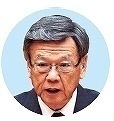Governor to exercise authority even if defeated in court

Governor Takeshi Onaga
March 9, 2016 Ryukyu Shimpo
The recent settlement between the Japanese national government and the Okinawa prefectural government over the nullification of the permit to reclaim land off the coast of Henoko, Nago City was explained in Okinawa Governor Takeshi Onaga’s recent report to a full session of the February regular meeting of the Okinawa Prefectural Assembly.
The governor then fielded questions from assembly members about the settlement. Of the scope of the settlement, Governor Onaga stated, “I have said that I will abide by the court’s final verdict in an administrative capacity, but the settlement regards only the two lawsuits relating to the permit nullification. Going forward, we will see changes in the construction plans and designs, and I will determine the appropriate response to those changes in line with the law. I intend to maintain my stance [opposing the new base construction] going forward.” This means that in the event that Okinawa loses in a future lawsuit regarding the recent order from the national government for Onaga to revoke the permit nullification, the governor will still maintain his commitment to preventing the base construction, and intends to use his authority as governor where possible to achieve that aim. This comment was in response to a question by Assemblywoman Mio Nakamura of the Shamin-Goken party.
The same day, Governor Onaga told the press that he intends to appeal to the Committee for Settling National-Local Disputes regarding the order he received from the national government to revoke his nullification of the permit. That will entail filing an objection to the order and asking the Committee to conduct a review of the situation.
There are several ways in which the governor could use his authority to block the base construction going forward. He could formally revoke the land reclamation permit, a procedure different from the nullification currently at issue. Revocation is possible when new complicating circumstances arise after the permit authorization takes place. Additionally, because the construction project is so large in scale, it is almost certain that changes will need to be made to the design plans. Each of any such changes will necessitate authorization from the governor, and he could use his authority to deny authorization. When asked about the latter possibility in the assembly meeting by Assemblyman Osamu Toguchi of the Communist Party, head of the Executive Office of the Governor Masaru Machida expressed his understanding that if a permit request does not receive the governor’s authorization, construction based on the details of that request cannot proceed.
In response to a question by Assemblyman Moriyuki Teruya of the Liberal Democratic Party, Governor Onaga emphasized the legitimacy of Okinawa’s position. “When recommending an out-of-court settlement to the lawsuits between Okinawa and the national government, the court pointed out that both lawsuits went against the spirit of the revised Local Autonomy Law, which stipulates that the national government and local government bodies are equal before the law,” Onaga said.
In his report on developments in the administrative arm of Okinawa’s government, Governor Onaga stated, “Going forward, I will participate in talks with the national government. It is essential that Futenma not remain in its current location permanently. I hope members of the Prefectural Assembly, as well as the people of Okinawa, will display understanding and cooperation toward our efforts to eliminate the dangers posed by Futenma, including its relocation outside of Okinawa and the cessation of its operations within five years.”
(English translation by T&CT and Sandi Aritza)
Previous Article:Editorial: Nothing short of reducing US stationing in Okinawa will prevent repeated sexual assaults
Next Article:World’s largest coral transplantation in Okinawa
[Similar Articles]
- National government orders Okinawa to reinstate permit, Okinawa to file objection with dispute committee
- Prime minister accepts Henoko settlement, will suspend land reclamation work
- National government files new lawsuit against Okinawa, bringing Henoko issue back to court
- Onaga: “Government trying to wrest Okinawa into submission” with lawsuit
- Governor Onaga optimistic about settlement involving temporary suspension of Henoko construction
 Webcam(Kokusai Street)
Webcam(Kokusai Street)


